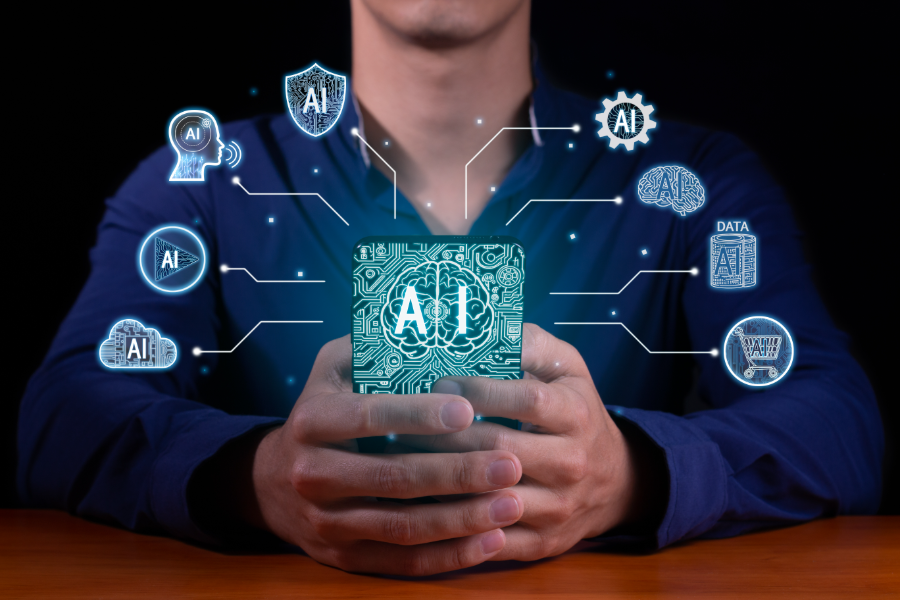Technological innovations bring profound changes worldwide, and digital marketing is not unaffected by them. While in the past, traditional methods such as email campaigns or search engine optimization were the main focus, the possibilities have significantly expanded. From data-driven decisions to the use of modern communication tools to optimize the customer experience – digital strategies are continuously evolving. Companies that keep up with these developments can stand out in the competitive environment. In this article, we take a look at which trends and tools can shape the future of digital marketing, what opportunities arise from them, and how companies can use them.
The Role of AI in Digital Marketing
Modern technologies influence digital marketing in many ways. They automate routine tasks, help analyze large amounts of data, and provide important insights for strategic decisions. All these aspects contribute to brands being able to align their campaigns more precisely and effectively.
- Today's consumers expect content and offers to be tailored to their needs. Data analyses help to better understand user behavior. Companies can use this data to provide personalized recommendations, design emails precisely, and even offer dynamic websites that adapt to visitors' preferences. The result: higher customer loyalty and better interaction rates.
- More and more companies are using chat functions to interact directly with their customers. Chatbots that can answer simple inquiries are just one component. Even more important are tools that efficiently organize customer conversations and forward important information. Customers benefit from quick assistance, while companies can optimize their support processes.
- Search engines like Google are constantly evolving, which is why companies must adapt their content accordingly. An important role is played by analyzing user behavior and optimizing content for different search intents. It is particularly relevant to provide content that can also be easily found in voice searches.

- The development of high-quality content remains essential for companies. However, the process is increasingly supported by digital tools that can identify topics, suggest texts, or edit videos. This allows campaigns to be implemented faster and adapted to different channels.
- Advertising today is data-driven and flexible. Thanks to automated systems, companies can react precisely to current developments and dynamically adjust ads. This applies both to targeting audiences and budget management. Continuous testing enables strategies to be constantly improved and optimized.
- In the future, companies could increasingly rely on data analyses to create more precise forecasts about buying behavior and demand. These predictive insights are likely to play a crucial role in planning marketing campaigns more efficiently and using resources more strategically. The long-term goal could be to proactively identify customer needs and present tailored offers exactly when they are in the highest demand.
- Social media remains a crucial factor for brand communication. Analyzing user feedback and posts enables companies to tailor content to current trends. Automated planning and analysis tools make it easier to implement long-term strategies.
- With the spread of voice assistants, the way people search on the Internet is changing. Companies must ensure that their content is suitable for these queries. This means focusing more on long, natural search phrases and optimizing local content.
How AI Will Continue to Shape Digital Marketing
1. Hyper-Personalized Advertising
In the future, AI could take hyper-personalization to a new level by delivering content in real-time that is individually tailored to each user. Brands are likely to use AI increasingly to approximately assess customer behavior, generate personalized product recommendations, and flexibly adapt dynamic pricing models to current demand.
2. AI-Generated Content and Creativity
AI-driven content creation tools are evolving and enabling companies to effortlessly produce high-quality articles, graphics, and videos. Future advancements include AI-supported graphic design, automated storytelling, and AI-generated brand narratives.
3. Ethical AI and Consumer Trust
As AI grows, ethical issues related to data protection and consumer trust are becoming increasingly important. Marketers must prioritize the transparent use of AI to protect customer data, avoid AI bias, and strengthen brand credibility.

AI in Email Marketing: Intelligent Campaigns for Better Interactions
Email marketing has significantly evolved thanks to AI-powered automation and personalization. AI enables companies to send highly relevant emails based on user behavior, preferences, and interaction patterns.
AI-Supported Optimization of Subject Lines
AI analyzes the performance of past email campaigns to generate high-converting subject lines that maximize open rates. By testing different variations, AI ensures that each campaign has the best possible chances of success.
Automated Email Segmentation and Targeting
Instead of manual segmentation, AI can automatically classify email subscribers based on interests, purchase history, and browsing behavior. This ensures that each user receives personalized content that appeals to them.
Intelligent Optimization of Sending Time
AI determines the optimal time to send emails to each recipient to increase the likelihood of interaction. AI tools analyze historical data and schedule emails at the times when users are most likely to open and click.
AI-Supported Video Marketing: Revolutionizing Content Strategy
Video content is now a central marketing tool, and AI helps brands create, edit, and optimize videos more efficiently. AI-supported video marketing tools can create personalized video suggestions, enhance video quality, and automate content creation.
AI-Based Video Creation and Automation
AI tools like Runway ML and Synthesia enable marketers to create videos without expensive production teams. AI can automatically cut, edit, and enhance videos, making professionally looking content more accessible.
Personalized Video Content for Customers
AI allows brands to create tailored video ads based on user data. Streaming services like Netflix and YouTube use AI-powered recommendation systems to offer personalized content.
Automated Video Transcription and SEO Optimization
AI tools transcribe video content, making it more searchable for search engines and accessible to a broader audience. Search engines can index video transcripts, increasing visibility and engagement.

AI in Influencer Marketing: Finding the Right Brand Ambassadors
Influencer marketing is one of the most effective digital marketing strategies, and AI makes it easier for brands to find the right influencers and measure campaign success.
AI-Supported Influencer Discovery
AI scans social media to identify influencers with high engagement rates and suitable target audiences. AI tools analyze influencer credibility, audience demographics, and past campaign performance.
Fraud Detection and Analysis of Fake Followers
With AI-supported fraud detection, brands can exclude influencers with fake followers or interactions. This ensures that marketing budgets are spent on authentic influencers who provide real value.
Performance Analysis and ROI Tracking
AI tracks influencer campaign results in real time and analyzes metrics such as engagement, conversions, and audience sentiment. This allows companies to refine their influencer strategies for maximum impact.
AI-Powered Voice Assistants and Intelligent Marketing Strategies
As more people use voice assistants like Alexa, Siri, and Google Assistant, companies must optimize their marketing strategies for voice searches and smart devices.
Optimization of Voice Search for SEO
AI is changing search behavior as users increasingly use natural language queries. Brands must optimize content for long-tail keywords and conversational phrases to appear in voice search results.
AI-Powered Shopping and Voice Commerce
Many brands integrate AI-powered voice assistants into their e-commerce platforms. Consumers can search for, compare, and purchase products via voice commands, making shopping more convenient.
Conversational Marketing through AI Assistants
AI-powered voice assistants enable real-time interactions with customers. Brands can use AI chatbots integrated with voice technology to provide instant responses, recommendations, and customer service.
AI in Predictive Customer Behavior: Understanding User Intentions
In the future, AI could fundamentally change customer journey mapping by predicting user behavior even more precisely and helping brands flexibly adapt their marketing strategies. Using advanced AI models, companies could analyze browsing behavior, past purchases, and interaction patterns in detail to identify users who are highly likely to make a purchase decision. This would allow brands to target potential customers even more precisely and effectively.
Churn Prediction and Customer Retention Strategies
AI helps companies identify at-risk customers who may churn. By analyzing interaction data, brands can develop targeted customer retention measures.
Real-Time Customer Insights for Better Decision-Making
AI continuously collects and analyzes customer data, providing businesses with real-time insights. This allows brands to quickly adjust their marketing strategies and enhance customer satisfaction and loyalty.
Conclusion
AI is redefining digital marketing by offering intelligent solutions to improve customer experience, content creation, SEO strategies, and advertising campaigns. As AI advances, brands that integrate this technology will achieve higher efficiency, better engagement, and increased revenue. In Switzerland, companies must adopt AI-powered marketing strategies to remain competitive in the digital landscape. The influence of AI on automation, personalization, and data-driven decisions will shape the future of marketing, pushing businesses to invest in AI-powered tools and strategies.
FAQs
1. How is AI used in digital marketing?
AI in digital marketing automates tasks, personalizes customer experiences, optimizes SEO, improves audience targeting, and facilitates content creation.
2. Can AI improve customer retention in marketing?
Yes, AI-powered chatbots, predictive analytics, and personalized content help brands engage customers in real-time, increasing conversion rates and customer loyalty.
3. How does AI influence SEO strategies?
AI optimizes SEO by analyzing user intent, improving rankings for voice searches, automating keyword research, and enhancing content relevance for better visibility.
4. What role does AI play in social media marketing?
AI supports social media marketing through sentiment analysis, automated post-scheduling, influencer identification, and targeted audience engagement to boost interaction rates.
5. Will AI eventually replace human marketers?
AI will increase efficiency in marketing but will not replace human creativity, strategic thinking, and emotional intelligence, which remain crucial in digital marketing.



